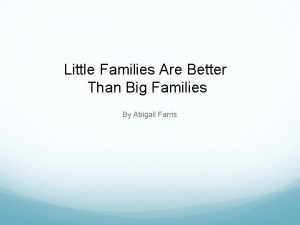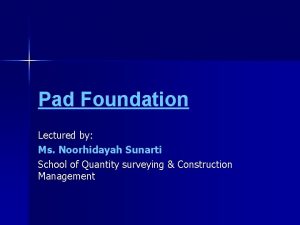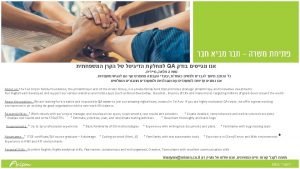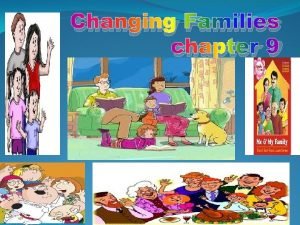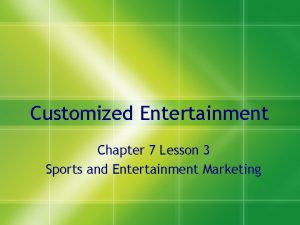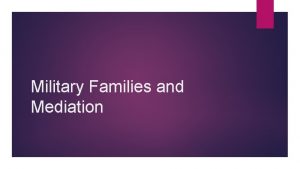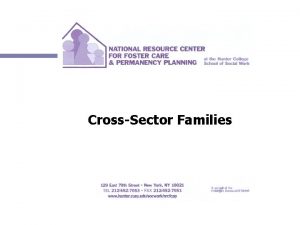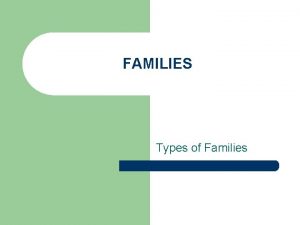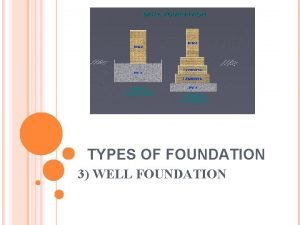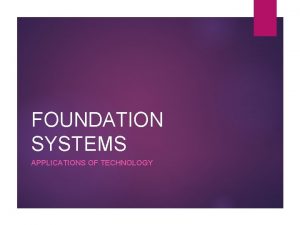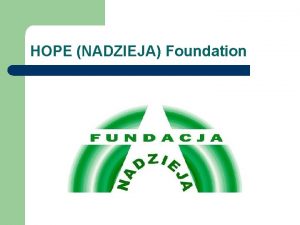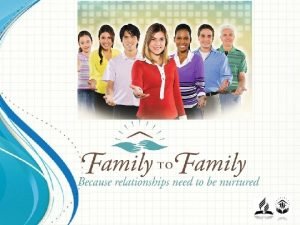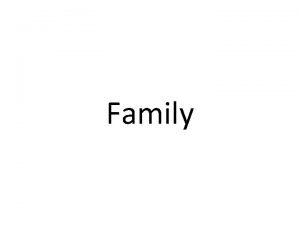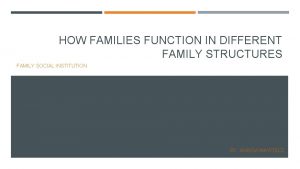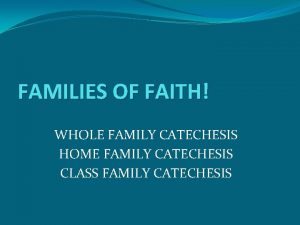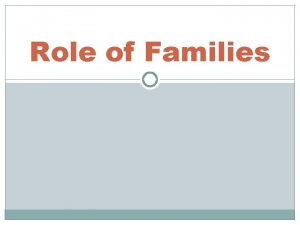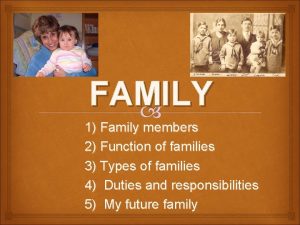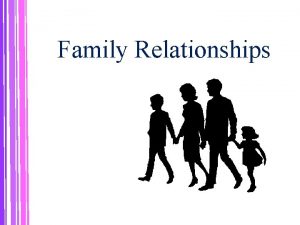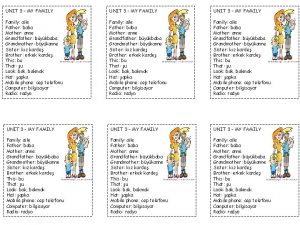Unit 1 The Family Foundation Chapter 1 Families





















- Slides: 21

Unit 1: The Family Foundation Chapter 1: Families, Society and You

Lesson Essential Questions 1. What are the functions of the family? 2. How do families and society affect each other? 3. What are ways that families can take responsibility for being strong? 4. What are skills that contribute to a strong family life? 5. How does studying families help you in the future?

1. 1 The Need for Strong Families LEQ 1: Functions of the Family Families are so important because they provide a function to their members: • • • Love and affection Protection Education Procreation Socialization Security Teaching values Economic support Guidance Recreation When families do not carry out their functions, they’re known as dysfunctional families. A dysfunctional family may meet some of its functions, and the family can use its strengths to solve problems. There’s also community and government programs to help dysfunctional families.

Activity: Review the list of functions of a family (5 minutes) • Is it possible to rate the functions is numerical order of importance? • Are some of the functions more important than others? • Is one the most important of all? Support your opinions with examples or specific reasons. Then Students pair up: (Blue/red and yellow/orange)-role play scenes in which families are not fulfilling their function or are dysfunctional. (5 minutes)

The Family: The Basic Unit of Society • Society is a group of people who have developed patterns of relationships from being around one another. These people often live in a community. A community is a common area where different people live. • Each community is made up of families. Families are vital to the health of society.

LEQ 2: Society and Families • Families can affect the larger society. • Family Law – Laws of all types have an affect on society. How? What laws affect our society?

What kinds of laws affect families? • Local, state and national laws affect the education of children. • Marriage and Divorce laws • Adoption laws • Laws deal with taxes and interest rates influence how much money families have • Some laws are set up to help people who are poor, out of work, or need help. • National Social Security laws have an impact on older adults. • Child, spouse and elder abuse laws • Juvenile law

The Business World • The business world also cares about strong families. • Families and businesses affect each other. When workers have problems at home, their work often suffers too. Stress at work affects how workers relate to each other and their families. • When businesses have policies to help with families’ needs, it often leads to success. If employers can be flexible, it makes it easier for parents to meet their children’s needs. When home life is better, and people are happier. This makes more effective workers.

Community Involvement • Groups that help families: – Social agencies – Religious groups or spiritual leaders – Education – Police and the courts – Communities have parks and activities

Imagine…. • Imagine your life without a community around it to offer services and support. Would life be different? What are some ways different aspects of the community help to support families? Jot down ways your community helps or has helped your family.

LEQ 3: The Family’s Responsibility • Society works to help families with their needs through various resources, but the family needs to take an active role as well. • Taking responsibility: Families can find their strength and build on them. • Family Strengths: Families have strengths that work for them. Some examples: – Communicate by listening and sharing feelings – Support each other – Spend time together, both working and playing – They care

No family is perfect • Each family has different strengths and weaknesses. • A family’s strength is not measured by how much money they have, it is measured by how well the family works together, the support they give each other, and how that family works to build their strengths to become strong.

Who cares about strong families? • Strong families are healthy families. These are the families that meet the needs of their members to the best of their ability. What does a strong family look like? – They see strengths they have and know what they need to work on. – They look for ways to cope with problems and to find answers – They are willing to ask for help if needed. • Society needs strong families. Families’ strengths join with those of other families to make a strong society.

Check for Understanding • What are at least 4 functions of the family? • List 2 ways that society is directly linked to family? • Why do families have to take responsibility for building their strengths?

Activity: Write a paragraph description about how your study of this section has changed or influenced your ideas about the kind of family you would like to have in the future. Share paragraphs with cooperative pairs: Blue/yellow, red/orange

1. 2 Why Study Families? • There are many skills needed to build a strong family. These are called interpersonal skills. They help people get along better. • Some interpersonal skills: – Communication – Problem solving and decision making skills – Management – Conflict resolution skills

LEQ 4: Strengthen your family now • Families today have many challenges. Some are more complicated than others. Learning about family lie will increase your knowledge about what happens in relationships, both inside and outside the family. • What do families need to help them solve their problems? They need to know: – – – The family comes first. Every family member contributes Change is possible Problems can be solved How to solve problems Where to get help.

LEQ 5: Look to the Future • You may form a family in the future, and if you do you will have the ability to make it what you want it to be. • Learn About Yourself – What you learn about families will give you a better understanding of yourself. As you study families you will see the vital link between families and their members. You may find ways to strengthen that link in your own life.

Put your knowledge to use • In a sense, the family is a mini-version of the world. You can put the knowledge of what you’ve learned into use.

Working with Families • As you study the family, you may find that your interest goes beyond your personal life. Some people choose careers that let them work with families.

Check for Understanding • Name 4 interpersonal skills needed for strong families. • List 2 ways you can use what you learn in this class in your future.
 Big families vs small families
Big families vs small families Pad foundation
Pad foundation Composition of urine
Composition of urine Siemer family foundation
Siemer family foundation Ted arison family foundation
Ted arison family foundation Unit 10, unit 10 review tests, unit 10 general test
Unit 10, unit 10 review tests, unit 10 general test Changing families class 4 evs lesson plan
Changing families class 4 evs lesson plan Chapter 9. voices and instrument families
Chapter 9. voices and instrument families Chapter 7 sports and entertainment marketing
Chapter 7 sports and entertainment marketing Hình ảnh bộ gõ cơ thể búng tay
Hình ảnh bộ gõ cơ thể búng tay Bổ thể
Bổ thể Tỉ lệ cơ thể trẻ em
Tỉ lệ cơ thể trẻ em Gấu đi như thế nào
Gấu đi như thế nào Tư thế worm breton là gì
Tư thế worm breton là gì Hát lên người ơi alleluia
Hát lên người ơi alleluia Các môn thể thao bắt đầu bằng tiếng đua
Các môn thể thao bắt đầu bằng tiếng đua Thế nào là hệ số cao nhất
Thế nào là hệ số cao nhất Các châu lục và đại dương trên thế giới
Các châu lục và đại dương trên thế giới Cong thức tính động năng
Cong thức tính động năng Trời xanh đây là của chúng ta thể thơ
Trời xanh đây là của chúng ta thể thơ Cách giải mật thư tọa độ
Cách giải mật thư tọa độ
